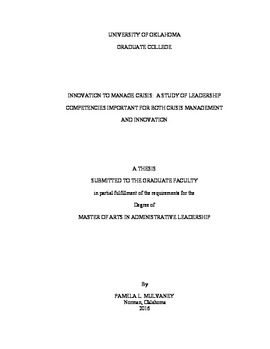| dc.contributor.advisor | Duncan, John | |
| dc.contributor.author | Mulvaney, Pamela | |
| dc.date.accessioned | 2016-05-13T14:25:54Z | |
| dc.date.available | 2016-05-13T14:25:54Z | |
| dc.date.issued | 2016-05 | |
| dc.identifier.uri | https://hdl.handle.net/11244/34671 | |
| dc.description.abstract | This study examines the correlation between leadership competencies found in organizations dealing with crisis and organizations known for their innovation. It is hypothesized that identifying leadership competencies that are associated with both crisis management and innovation will help an organization develop employees who will successfully handle crisis while influencing innovative thinking. A qualitative analysis was conducted on various media publications to systematically record leadership competencies. Both private and public sector organizations were compared for differences and similarities. The question was considered if it is better to develop these competencies and behaviors or should the emphasis be placed on recruitment of experience. Results indicate that organizations experiencing crisis show less competencies in the areas of signal detection and prevention than organizations who are known for innovation. Additionally, organizations who show a large amount of innovative leadership competencies manage crisis in a shorter time and may actually come out in a better position than what they were pre-crisis. | en_US |
| dc.language | en_US | en_US |
| dc.subject | Leadership Competencies | en_US |
| dc.subject | Crisis | en_US |
| dc.subject | Innovation | en_US |
| dc.title | Innovation to Manage Crisis: A Study of Leadership Competencies Important for Both Crisis Management and Innovation | en_US |
| dc.contributor.committeeMember | Gabert, Trent | |
| dc.contributor.committeeMember | Wuestewald, Todd | |
| dc.date.manuscript | 2016-05 | |
| dc.thesis.degree | Master of Arts in Administrative Leadership | en_US |
| ou.group | College of Liberal Studies | en_US |
| shareok.nativefileaccess | restricted | en_US |
